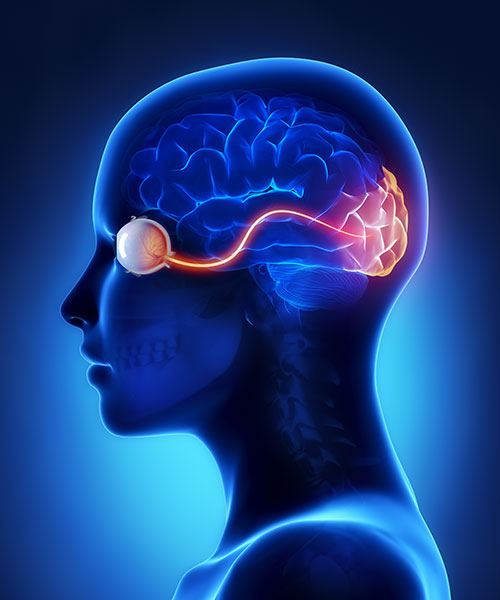
Neuro-Optometry is a specialty within optometry involving the evaluation, diagnosis, and management of visual and neurologic conditions. The role of a neuro-optometrist is to provide diagnostic insight and rehabilitative/adaptive treatment options for patients who are struggling particularly with double vision, neurological visual field loss, visuo-spatial or visual perceptual deficits, dizziness and vertigo, or additional visual complaints due to brain injuries and/or neurological disease.
It is estimated that 75% of the information processed by the brain comes from the visual system and 50% of your brain’s cortex is dedicated to visual processing. As a result, several neurologic conditions will have manifestations in the visual system, or changes in the visual system may be the first presenting sign of a neurologic condition. These conditions can include acquired brain injuries (such as a concussion or stroke) or chronic headaches and migraines, but may include neuro-inflammatory disorders, neuromuscular conditions, or neurodegenerative conditions. Because your optic nerves share the same cerebrospinal fluid (CSF) as the brain, optic nerve swelling may be the first sign of increased intracranial pressure.
What’s the difference between Optometry and Neuro-Optometry?
Optometrists are primary care providers for the eyes and visual system. An optometrist has received post-graduate training from a four-year accredited optometry school in the evaluation, diagnosis, and management of vision and ophthalmic conditions. They are qualified to prescribe spectacles and contact lenses and are qualified in the diagnosis and management of common ophthalmic conditions: such as dry eye disease, glaucoma, cataracts, age-related macular degeneration, and a variety of ocular emergencies.
Neuro-optometry is a subspecialty within the field of optometry. A neuro-optometrist is an eyecare provider with specialized training in the evaluation, diagnosis, and management of neurologic and neuro-ophthalmic conditions. This training can be received in a variety of ways following optometry school. An accredited 1-year optometric residency program is the most in-depth form of training, as it is a competitive, rigorous program in evidence-based medicine and current standards of practice. Some providers also achieve a fellowship designation from a private optometric organization, such as the American Academy of Optometry (AAO) or Neuro-Optometric Rehabilitation Association (NORA). This is separate from or in addition to a residency and provides opportunities for enhanced skills and furthered continuing education within the field. Providers with fellowship designation demonstrate a commitment to life-long learning and best practices.
I already see my eyecare provider regularly. Why might I need a neuro-optometric evaluation?
Annual comprehensive eye exams, typically given by an optometrist, are a crucial part of checking your visual clarity & ocular health. While your annual eye exam can serve as an initial screening for visual function disorders, a more in-depth evaluation is needed to properly diagnose and prescribe an individualized treatment plan. The results of a neuro-optometric evaluation will frequently help to provide diagnostic insight for your other providers and therapies. Neuro-optometric examinations and rehabilitation services are beyond/complementary to primary eyecare services and can be co-managed with your current primary eyecare providers (optometrist and/or ophthalmologist).
Explore Neuro-Optometry at CSNA
We at CSNA have comprehensive care for our patients and the community. To get started exploring Neuro-optometric examinations and rehabilitations services, call Colorado Springs Neurological Associates today at 719-473-3272. You can also contact a CSNA representative using our online form, or follow the CSNA Facebook page for news and helpful resources.

